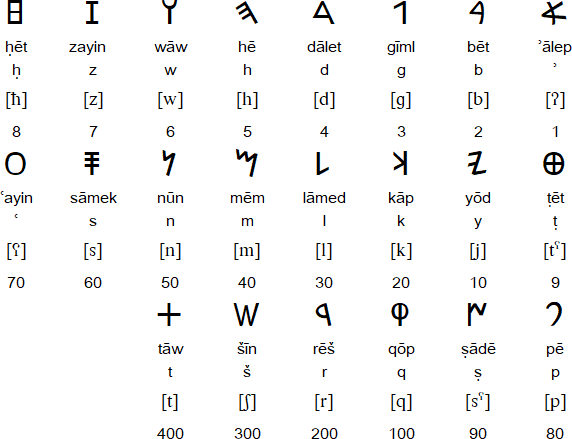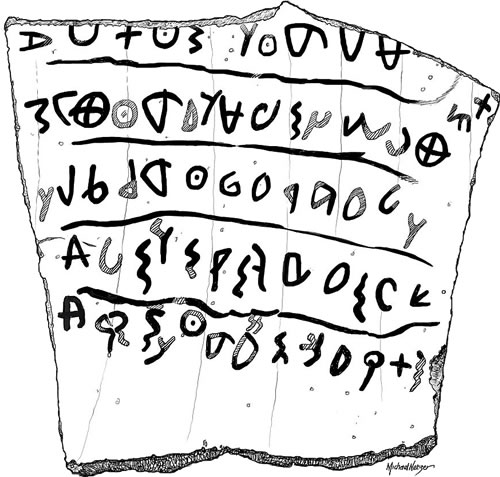![]()
The Paleo-Hebrew alphabet was used between about 1,000 BC and 135 AD to write Ancient Hebrew in the Biblical regions of Israel and Judah. It developed from the Proto-Canaanite script, which was used in Canaan (the Levant) during the Late Bronze Age. Paleo-Hebrew is also known as the Proto-Hebrew or Old Hebrew script.
The earliest known inscription in Paleo-Hebrew was found on a wall in Tel Zayit in the Beth Guvrin Valley in southern Israel in 2005. It dates from about the 10th century BC. By the 6th century BC the Paleo-Hebrew alphabet was gradually replaced by the Imperial Aramaic alphabet, which developed into the Hebrew square script. The Paleo-Hebrew alphabet continued to be used for some texts of the Toarh, and also on coins, until the 2nd century AD.

Download an alphabet chart for Paleo-Hebrew (Excel)

Source: https://en.wikipedia.org/wiki/Paleo-Hebrew_alphabet
Information about Paleo-Hebrew
https://en.wikipedia.org/wiki/Paleo-Hebrew_alphabet
https://www.ancient-hebrew.org/ancient-alphabet/paleo-hebrew-alphabet.htm
https://www.bible.ca/manuscripts/Septuagint-LXX-Hebrew-ancient-earliest-writing-Bible-scripts-alphabets-origin-Mosaic-heiroglyphic-Paleo-Aramaic-Masoretic-Jewish-Greek.htm
https://www.academia.edu/37043663/The_Paleo_Hebrew_Alphabet_The_Complete_Scientific_Research
https://www.oocities.org/gali_al_bulgari/Hebrew_Scripts.html
https://www.soamibooks.com/paleohebrewnumbers
Ancient Berber, Arabic, Aramaic, Chorasmian, Elymaic, Hatran, Hebrew, Manichaean, Nabataean, North Arabian, Pahlavi, Palmyrene, Parthian, Phoenician, Paleo-Hebrew, Proto-Sinaitic / Proto-Canaanite, Psalter, Punic, Sabaean, Samaritan, Sogdian, South Arabian, Syriac, Tifinagh, Ugaritic
Page last modified: 14.04.24
[top]
You can support this site by Buying Me A Coffee, and if you like what you see on this page, you can use the buttons below to share it with people you know.

If you like this site and find it useful, you can support it by making a donation via PayPal or Patreon, or by contributing in other ways. Omniglot is how I make my living.
Note: all links on this site to Amazon.com, Amazon.co.uk
and Amazon.fr
are affiliate links. This means I earn a commission if you click on any of them and buy something. So by clicking on these links you can help to support this site.
[top]